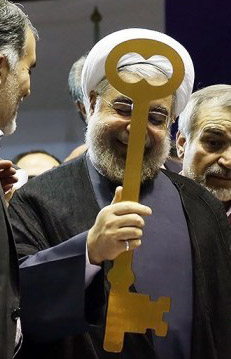Tehran, YJC. Rouhani’s victory ended the 11th elections. While it is clear that he represents the Executives and the Reform movement, debates will probably continue on who is on the defeated side and why were they defeated.
 It may not be possible to say that the Reform wing has the whole victory
as Hassan Rouhani is elected President, but one can assume surely that the loss
went to a movement which created a lot of issues for the country by supporting the
government’s political and economical approaches during the past 8 years.
It may not be possible to say that the Reform wing has the whole victory
as Hassan Rouhani is elected President, but one can assume surely that the loss
went to a movement which created a lot of issues for the country by supporting the
government’s political and economical approaches during the past 8 years.
What is important is that there can be numerous reasons for this defeat:
·
The fact that the
Principalists did not make coalition on a single candidate as the
hypothetically main reason.
·
The emergence of a new
group under the name of "Stability” which accused other political currents of "suspicion”
of the achievements of the past 8 years.
·
The Ahmadinejad administration’s
record. In fact the same way that the Ahmadinejad administration tapped into
the weaknesses in the Reform administration’s performance to rise to power, its
own ineptitude made people redirect their votes to the Reform movement.
·
The small number of
Reformist candidates and Mohammadreza Aref’s resignation in favor of Rouhani.
·
Mohammad Khatami and Akbar Hashemi
Rafsanjani’s endorsement of Rouhani.
The Principalist Lawmaker Ahmad Tavakoli had said based on the preliminary
polls "Whether Hassan Rouhani wins in the first round or the elections draw on
to a runoff, the time has come to make up for the damages of the Ahmadinejad administration.”
What is now obvious is that some Principalist groups try to introduce
the Stability Front as responsible for this defeat in order to be able to
revive the Party for four years later. But it seems that the total number of
votes went to the Principalists was not enough to make them a decisive victory.
On the other side it seems that the Reform and Executive wings are
trying not to make their past mistakes again. They intend to form an inclusive
government and a national coalition to ensure their long-lasting presence in
power and, using Reformist figures, members of the Construction administration,
as well as moderate Principalists, underpin their power structure for coping
with Principalist waves, and probably the incumbent administration current, in
the next election.
No doubt the new administration will be no place for extremist
Principalists and members of the incumbent administration.
* Hossein Amiri
